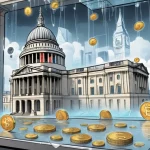Nigel Farage’s Bitcoin Reserve Pledge: UK Crypto Leap or Political Gimmick?

Nigel Farage’s Bitcoin Reserve Bombshell: UK Crypto Revolution or Political Mirage?
Nigel Farage, the firebrand leader of Reform UK and a possible future Prime Minister, stunned attendees at the Bitcoin 2025 conference in Las Vegas with a pledge to establish a Bitcoin reserve within the Bank of England if elected. This audacious plan, paired with promises of sweeping crypto legislation, aims to thrust the UK into the forefront of digital finance—but is it a genuine push for freedom or just a populist stunt?
- Bitcoin Reserve Plan: Farage wants the Bank of England to hold Bitcoin as a national asset, a bold leap for a traditional institution.
- Crypto Legislation Push: A proposed bill targets crypto adoption and protection from debanking, with London eyed as a global hub.
- Anti-CBDC Crusade: He fiercely opposes Central Bank Digital Currencies, branding them as government tyranny.
The Vision: A Bitcoin Reserve at the Heart of British Finance
During a fireside chat with Frank Corva on the third day of the Bitcoin 2025 conference, Farage laid out a radical vision for the UK’s financial future. “We are going to have a Bitcoin digital reserve in the Bank of England,” he declared, positioning this move as a cornerstone of what he calls a “crypto revolution.” For the uninitiated, a reserve asset is essentially a safety net of value—think gold or foreign currencies—that a central bank holds to stabilize the economy. Bitcoin, with its decentralized and volatile nature, is a wild card in this role, meant to signal the UK’s embrace of financial innovation, as highlighted in discussions about Nigel Farage’s potential plans for a Bitcoin reserve. At the time of his speech, Bitcoin was trading near all-time highs around $104,178, per recent market data, adding symbolic weight to his promise.
Farage’s broader agenda includes a “Crypto Assets and Digital Finance Bill” designed to weave cryptocurrencies into the fabric of the UK’s economy. His goal? Transform London into a premier global trading hub for digital assets. He lambasted both Labour and Conservative governments for dragging their feet, pointing out,
“Seven million people in Britain have got crypto assets. One in four people under 30 have got crypto assets. And yet, our outdated Labour and Conservative governments have done nothing in this space at all.”
These figures underscore a growing appetite among Brits—especially younger generations—for a financial system that mirrors their digital-first lives. Farage also nodded to recent pro-crypto shifts in the US as a blueprint, suggesting the UK could seize a similar opportunity with the right leadership, a topic explored in recent updates on Farage’s Bitcoin reserve proposal.
Debanking: A Personal Battle Turned Policy Fight
One of Farage’s most relatable talking points is the scourge of debanking—a term describing the practice where banks deny or close accounts due to a customer’s involvement in crypto trading or even their political beliefs. It’s a frustrating reality for many in our space, often leaving users stranded without access to basic financial services. Farage promised a hard stop to this, proclaiming,
“No more debanking, ladies and gentlemen.”
He’s pushing for laws to ensure no bank can shutter accounts over legal crypto activities, a direct response to a pain point felt by countless traders and enthusiasts, as discussed in community forums like Reddit threads on debanking crypto users in the UK.
This isn’t just policy for Farage; it’s personal. He shared a chilling account of being rejected by ten different banks, an ordeal he tied to both his political views and crypto ties.
“It was a very, very scary experience. But I fought back. I fought back publicly, and I won,”
he recounted. This 2023 clash with Coutts and NatWest, which saw internal documents label him a “reputational risk,” even spurred UK government action to tighten rules on account closures, requiring banks to justify decisions and offer a 90-day appeal window. Farage’s story mirrors the struggles of a young crypto trader in Manchester or a blockchain startup in Bristol, cut off by arbitrary bank policies. But on the flip side, banks argue they’ve got a right to manage risks—crypto’s regulatory gray areas and money laundering fears aren’t trivial. Balancing individual liberty with financial stability is a messy tightrope, and Farage’s proposed legislation will need teeth to navigate it, a challenge noted in Reddit discussions on his crypto legislation plans.
CBDC Opposition: Freedom vs. Centralized Control
Perhaps the most fiery segment of Farage’s speech was his takedown of Central Bank Digital Currencies (CBDCs), like the Bank of England’s proposed “Britcoin.” For those new to the term, a CBDC is a government-issued digital currency, fully controlled by the central bank, often sold as a modern replacement for cash with perks like faster transactions. Farage sees it as a dystopian trap, warning it’s a pathway to unchecked surveillance and control. He didn’t mince words, stating,
“When we win the next election, there’ll be a CBDC over my dead body.”
His stance echoes a core Bitcoin principle: decentralization as a defense against overbearing authority, a sentiment he tied to his Brexit legacy by calling Bitcoin “the ultimate freedom from big government.” This opposition aligns with broader concerns detailed in analysis of the UK CBDC Britcoin development status.
Let’s not sidestep the other side, though. Advocates of CBDCs, including some economists and policymakers, argue they can boost financial inclusion—think unbanked rural folks gaining access via digital wallets—and cut fraud through traceable transactions. The Bank of England has pitched Britcoin as a tool for efficiency, not oppression. Yet, for Farage and many Bitcoiners, the trade-off isn’t worth it; centralized control undermines the very autonomy crypto was built to protect. This clash of visions—freedom versus streamlined systems—lies at the heart of the digital finance debate, and Farage is planting his flag firmly in the decentralized camp.
Policy Nuances: Crypto Taxes and Political Innovation
Beyond the headline-grabbing reserve idea, Farage’s plan includes specifics that deserve scrutiny. A proposed 10% capital gains tax on crypto assets, for instance, aims to legitimize the space while generating revenue. Currently, UK tax rules treat crypto as property, taxing gains at rates up to 20% depending on income brackets. A flat 10% could be seen as competitive—Germany, for example, offers tax-free gains after a year of holding—but it might still irk long-term holders dreaming of zero-tax utopias. Will this attract traders to the UK, or push them toward offshore havens? It’s a gamble that could shape adoption rates, as explored in analyses of Farage’s financial strategy for a Bitcoin reserve.
Adding to his crypto cred, Farage’s Reform UK party is breaking barriers as the first European political outfit to accept crypto donations, a move announced alongside his conference speech. This isn’t just symbolic; it’s a test of how digital assets might reshape campaign finance, though it opens doors to scrutiny over money laundering or regulatory loopholes. These details show Farage isn’t just spouting buzzwords—there’s a framework forming, even if it’s raw and untested.
Reality Check: Can a UK Bitcoin Reserve Actually Happen?
Now, let’s cut through the excitement and face the hard truths. The notion of the Bank of England—a bastion of financial conservatism—holding Bitcoin is a tough sell. Unlike gold, Bitcoin’s price swings could send shudders through risk-averse bureaucrats. Look at El Salvador, the poster child for national Bitcoin adoption. Since making it legal tender in 2021, they’ve amassed over 5,800 BTC, with reported profits topping $80 million during recent bull runs as of 2025 data. But they’ve also weathered steep losses during bear markets and faced criticism from the IMF for fiscal recklessness. Public sentiment there remains split—some hail it as visionary, others see it as a reckless experiment. Farage’s plan could mirror this rollercoaster, amplified by the UK’s larger economic stage, a feasibility concern echoed in Bank of England reports on digital currency reserves.
Then there’s the logistical nightmare. How would the Bank of England custody Bitcoin? Cold storage wallets in a vault sound nice, but cybersecurity risks are real—think historic disasters like the Mt. Gox hack of 2014, where 850,000 BTC vanished. A national treasury breach would be catastrophic. And let’s not ignore the environmental blowback; Bitcoin mining’s energy hunger draws ire from green advocates. While renewable mining and layer-2 solutions like the Lightning Network are easing concerns, Farage will need answers ready for the inevitable climate critique.
Politically, the horizon is distant. The next UK general election isn’t until August 2029, meaning Farage’s promises are a long-term pitch, not a near-term shift. His polarizing image—once deemed a “reputational risk” by banks—might alienate the establishment needed to enact such upheaval. Will mainstream voters, many of whom still view crypto as internet funny money, rally behind a Bitcoin reserve? And here’s the kicker: housing Bitcoin in a centralized body like the Bank of England feels like a betrayal of its decentralized roots. It’s a paradox that should keep purists up at night—can a system built to defy gatekeepers thrive under their roof? Background on his political journey can be found in Nigel Farage’s Wikipedia profile.
Global Ripple Effects and the Bigger Picture
Farage’s gambit isn’t just a UK story; it’s a potential catalyst for Europe. If the UK pivots hard into crypto, could it spark a domino effect? Nations like Germany or France, already wrestling with EU regulations like MiCA (Markets in Crypto-Assets), might feel pressure to loosen their own stances. Compare this to the US, where pro-crypto lawmakers post-2024 have pushed for clearer rules—Farage himself cited their progress as inspiration. Yet, global adoption isn’t all rosy; regulatory pushback and money laundering fears persist everywhere. The UK’s 7 million crypto owners—concentrated in hubs like London, a blockchain innovation hotspot—give Farage a base, but scaling that to national policy is another beast, a topic debated in Quora discussions on Farage’s policy impact.
There’s also the risk of scammers latching onto this hype. Political rhetoric about “Bitcoin reserves” could be twisted by fraudsters peddling get-rich-quick schemes. Let’s be clear: Bitcoin’s value lies in its tech and ethos, not empty promises or political posturing. Staying vigilant against such exploitation is non-negotiable as this debate unfolds.
Critical Questions for the Crypto Community
- What’s the crux of Nigel Farage’s Bitcoin plan for the UK?
He aims to establish a Bitcoin reserve at the Bank of England and introduce a Crypto Assets and Digital Finance Bill to position London as a global crypto trading hub. - Why is debanking a central issue in his crypto agenda?
Debanking—being excluded from banking services over crypto or political reasons—strikes a personal chord for Farage after his own battles, prompting legislation to shield users from such practices. - How does Farage frame CBDCs, and what’s his reasoning?
He views CBDCs like Britcoin as tools of tyranny, arguing they enable government surveillance, in stark contrast to Bitcoin’s decentralized liberty. - Is a UK Bitcoin reserve feasible in the near term?
It’s unlikely due to resistance from traditional institutions like the Bank of England, political hurdles, and a distant 2029 election timeline that delays any real action. - Could Farage’s crypto push gain widespread traction?
With 7 million UK crypto owners, there’s a niche audience, but his polarizing persona and crypto’s niche status might limit broader voter appeal for now.
Farage’s Bitcoin reserve proposal is a lightning bolt—thrilling for those of us who crave disruption, yet riddled with contradictions and roadblocks. It’s a stark reminder of why we champion decentralization: to dismantle systems that exclude and dominate. But it also demands we stay grounded, questioning whether political flair can translate to tangible change. If Farage ever storms Downing Street, the UK’s financial identity might take on a distinctly orange tint. Until then, it’s up to us to weigh if this is a revolution worth backing—or a mirage worth debunking.



